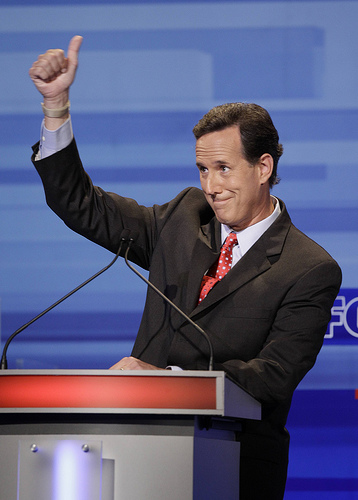GOP Debates Still Matter Despite Public Fatigue

The frequency of the debates have had a major presence in election coverage as the field of candidates vying for the Republican nomination has been whittled down to four, with Newt Gingrich and Ron Paul trailing Santorum and Romney. According to the most recent Gallup poll, Santorum is leading Romney nationally 36 to 26 going into the debate.
The sheer number of such televised verbal contests has led to grumblings from campaigns that the debates take up too much of the candidates’ time. The pre-Super Tuesday debate in Georgia was recently cancelled because too many candidates dropped out or declined. Moreover, critics have charged that the relentlessness of the debates has led to “debate fatigue” among viewers.
However, the debates remain an important part of the political process, even if members of the media are tired of covering them, according to some experts.
“The people that get fatigued tend to be the reporters that cover them,” said Thomas Hollihan, a professor of political communication at the University of Southern California.
Wednesday’s debate comes after a dramatic shift in the race. Gingrich is no longer Romney’s main challenger for the nomination. This will be the first debate since the beginning of Santorum's surge two weeks ago, in which the candidate took three primary or caucus contests in the same night. It also comes about a week before the primary in Michigan, where candidates have been spending plenty of time and money campaigning.
To be sure, the viewership ratings are not especially high for the debates, and the people who are watching may tend to be partisans who may have already made up their minds. About 5 million people watched the most recent CNN debate about a month ago, while almost 22 million watched American Idol that same week.
But Hollihan argued the debates are actually watched more heavily by voters in the particular state that is hosting the upcoming primary contest. “In other words," he said, "voters in Florida didn’t really tune in until the Florida debates, so they haven’t seen all the debates yet.”
In Michigan, Hollihan said, Romney needs to win or come very close. “The worst thing that can happen for Romney is if Santorum takes him by a margin of five or 10 points, because it will send a terrible message that no matter how much money he throws into this race, he just does not have the support of the party, particularly conservatives.”
Hollihan expects Romney to come out on the attack against Santorum in Wednesday’s debate and to paint Santorum as unelectable in the general election. Santorum, on the other hand, will say that Romney’s had his chance as the frontrunner, has resorted to too many attack ads and has still not proven he’s a true Republican. He will try to argue that if Romney can’t win his state of birth, in which his father was a very popular governor, then the party should turn away from him.
Michigan is crucial in the primary elections. It’s a large, complex state with a diverse population. It’s also perceived as a battleground state for the November general election. And it's worth noting that Romney won the state handily four years ago. But things may have changed this time around.
“If it appears that a lot of Republicans are holding their noses and voting out of reluctance rather than enthusiasm," Hollihan said, "I think it’s going to send a strong message about the vulnerabilities of the party in the fall."
In a election in which airtime is greatly affected by Super-PAC money, the debates are equalizers: They’re free media and they put all the candidates on the same stage at the same time talking about the same things. Furthermore, they’re rule-governed activities in a political space flooded with unchecked television attack ads. You have to be on the same stage as the person you’re attacking in debates.
In the general election, debates may not be as important as they might seem. In a big election, the voters have mostly made up their minds based on their party affiliation and—especially for unaffiliated voters—the state of the economy, said Indiana University sociology professor Fabio Rojas. “Barack Obama could probably come out in a clown outfit and win if the economy were good enough,” Rojas said.
With primaries, debates have a very different meaning. First of all, there are fewer votes up for grabs and individual votes mean more. Also, the candidates sometimes don’t start off as household names. Televised debates give them a chance to get their names out there. Social scientists call that a low-information environment. Debates can help fix for that.
Rick Perry, for instance, came into the race with strong polling numbers. But as soon as he started faltering at the debates, his status tanked. It wasn’t just the infamous “Oops” moment that did it. When he started discussing his immigration policies, he lost some support among the Republican base. “You turn on the TV and find out he supported scholarships for children of undocumented immigrants, and if you’re a conservative Republican you go, ‘Oh my God, he’s pro-illegal immigrant,’” Rojas said.
Debates also give a sense of what kind of general election candidate a Santorum or a Romney might be. Santorum is coming from a socially conservative point of view. Romney and Obama, in contrast, are careful talkers. They’re much more analytical in their speech patterns, compared with Santorum’s blue-collar emphasis.
Illustrating the effect oratory can have on public opinion, Bill Clinton excelled in debates against George H.W. Bush because he was personal and relatable. “A debate is like an audition for a movie,” Rojas said. “Even a guy like George W. Bush, who was a horrendous orator, understood that he needed to say certain things on TV to be a leader.”
Reach Executive Editor Ryan Faughnder here. Follow on Twitter.



